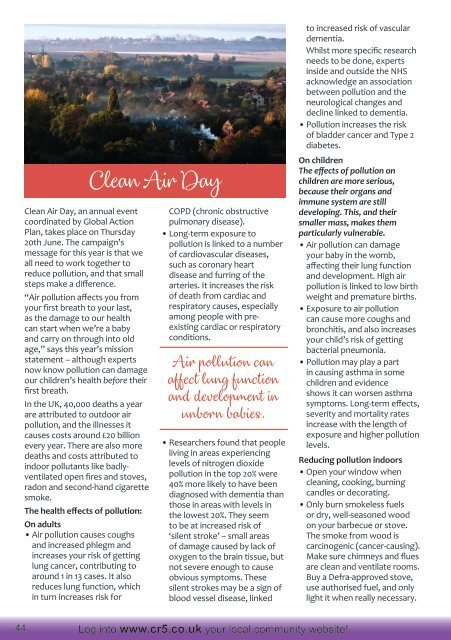CR5 Issue 169 June 2019
A local community magazine delivered free to 11,800 homes every month in the CR5 postcode. Contains local business advertising,interesting reads, Competitions, What's on in the Community and puzzles.
A local community magazine delivered free to 11,800 homes every month in the CR5 postcode.
Contains local business advertising,interesting reads, Competitions, What's on in the Community and puzzles.
You also want an ePaper? Increase the reach of your titles
YUMPU automatically turns print PDFs into web optimized ePapers that Google loves.
Clean Air Day, an annual event<br />
coordinated by Global Action<br />
Plan, takes place on Thursday<br />
20th <strong>June</strong>. The campaign’s<br />
message for this year is that we<br />
all need to work together to<br />
reduce pollution, and that small<br />
steps make a difference.<br />
“Air pollution affects you from<br />
your first breath to your last,<br />
as the damage to our health<br />
can start when we’re a baby<br />
and carry on through into old<br />
age,” says this year’s mission<br />
statement – although experts<br />
now know pollution can damage<br />
our children’s health before their<br />
first breath.<br />
In the UK, 40,000 deaths a year<br />
are attributed to outdoor air<br />
pollution, and the illnesses it<br />
causes costs around £20 billion<br />
every year. There are also more<br />
deaths and costs attributed to<br />
indoor pollutants like badlyventilated<br />
open fires and stoves,<br />
radon and second-hand cigarette<br />
smoke.<br />
The health effects of pollution:<br />
On adults<br />
• Air pollution causes coughs<br />
and increased phlegm and<br />
increases your risk of getting<br />
lung cancer, contributing to<br />
around 1 in 13 cases. It also<br />
reduces lung function, which<br />
in turn increases risk for<br />
Clean Air Day<br />
COPD (chronic obstructive<br />
pulmonary disease).<br />
• Long-term exposure to<br />
pollution is linked to a number<br />
of cardiovascular diseases,<br />
such as coronary heart<br />
disease and furring of the<br />
arteries. It increases the risk<br />
of death from cardiac and<br />
respiratory causes, especially<br />
among people with preexisting<br />
cardiac or respiratory<br />
conditions.<br />
Air pollution can<br />
affect lung function<br />
and development in<br />
unborn babies.<br />
• Researchers found that people<br />
living in areas experiencing<br />
levels of nitrogen dioxide<br />
pollution in the top 20% were<br />
40% more likely to have been<br />
diagnosed with dementia than<br />
those in areas with levels in<br />
the lowest 20%. They seem<br />
to be at increased risk of<br />
‘silent stroke’ – small areas<br />
of damage caused by lack of<br />
oxygen to the brain tissue, but<br />
not severe enough to cause<br />
obvious symptoms. These<br />
silent strokes may be a sign of<br />
blood vessel disease, linked<br />
to increased risk of vascular<br />
dementia.<br />
Whilst more specific research<br />
needs to be done, experts<br />
inside and outside the NHS<br />
acknowledge an association<br />
between pollution and the<br />
neurological changes and<br />
decline linked to dementia.<br />
• Pollution increases the risk<br />
of bladder cancer and Type 2<br />
diabetes.<br />
On children<br />
The effects of pollution on<br />
children are more serious,<br />
because their organs and<br />
immune system are still<br />
developing. This, and their<br />
smaller mass, makes them<br />
particularly vulnerable.<br />
• Air pollution can damage<br />
your baby in the womb,<br />
affecting their lung function<br />
and development. High air<br />
pollution is linked to low birth<br />
weight and premature births.<br />
• Exposure to air pollution<br />
can cause more coughs and<br />
bronchitis, and also increases<br />
your child’s risk of getting<br />
bacterial pneumonia.<br />
• Pollution may play a part<br />
in causing asthma in some<br />
children and evidence<br />
shows it can worsen asthma<br />
symptoms. Long-term effects,<br />
severity and mortality rates<br />
increase with the length of<br />
exposure and higher pollution<br />
levels.<br />
Reducing pollution indoors<br />
• Open your window when<br />
cleaning, cooking, burning<br />
candles or decorating.<br />
• Only burn smokeless fuels<br />
or dry, well-seasoned wood<br />
on your barbecue or stove.<br />
The smoke from wood is<br />
carcinogenic (cancer-causing).<br />
Make sure chimneys and flues<br />
are clean and ventilate rooms.<br />
Buy a Defra-approved stove,<br />
use authorised fuel, and only<br />
light it when really necessary.<br />
44 Log into www.cr5.co.uk your local community website!
















